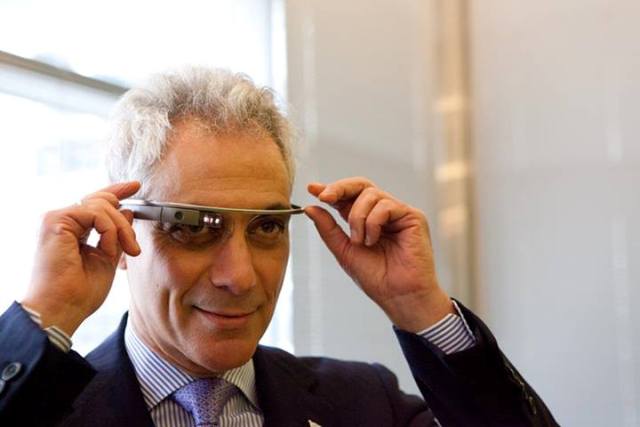Who Wants To Challenge Emanuel's Money?
By aaroncynic in News on Jul 28, 2014 3:00PM

Of course Mayor Emanuel would get a kick out of Google Glass. (Photo credit: City of Chicago/Brooke Collins)
Does anyone in Chicago really like Rahm Emanuel?
Before Cook County Board President Toni Preckwinkle emphatically announced she would not run for mayor next year, she led Rahm Emanuel in a Sun-Times “what if” poll by 24 points. Chicago Teacher’s Union President Karen Lewis, who has still yet to officially throw her hat in the ring, led our incumbent mayor in a head-to-head poll by nearly 10 percent.
Chicago’s “historic” 2011 mayoral election—which for the first time in decades featured no incumbent mayoral candidate—turned out just over 40 percent of registered voters. Considering only around 30 percent turned up for the previous two elections, that figure is at least less than abysmal.
During the February UIC faculty strike, I sat with a woman inside Jane Adams Hull-House, which had been turned into a temporary headquarters and warming center for striking teachers. She was a life-long teacher, somewhere past her mid-50’s, and talked about why it was so important for the faculty to have a voice as strong as the college’s administration. The politics of education go hand in hand with the politics of being mayor, and the conversation inevitably turned towards Rahm Emanuel. The woman, who I surmised had been a very long time resident said to me something along the lines of “Daley might have been a crook, but he was at least *our* crook.”
Nostalgia for an era of corrupt politics in comparison to today’s corrupt politics shows how people become apathetic.
Chicagoans may, in fact, be tired of shrugging their shoulders at an austerity agenda that closes more than 50 schools and still continues to slash the education budget, puts a questionable corporation with a track record of failure in charge of transit fares, spends a lot of time addressing crippling citywide violence but doesn’t seem to have concrete answers, and more.
Emanuel’s re-election strategy relies on the same tactic nearly every candidate in every election in recent memory has used—find the donors with unlimited amounts of money and get them to make it rain. The buck definitely doesn’t stop there, as purchased political capital soon becomes policy. Chicagoans are no strangers to patronage, but Emanuel’s relentless push to privatize as much of the city as he can makes Daley’s parking meter deal looks almost quaint.
Slightly more progressive voices are looking to capitalize on Emanuel’s dismal 29 percent approval rating and the populist energy behind a more radical candidate like Karen Lewis. The Sun-Times reports community organizing groups like Grassroots Illinois Action have been working with progressive organizing entities like the Working Families Party that have had electoral success in cities like New York. Organizations like the WFP helped elect New York City mayor Bill de Blasio on a populist-type platform critical of the NYPD’s out of control stop-and-frisk policy and pushed for public education. According to NBC5’s Ward Room, WFP helped elect Ras Baraka, a community organizer and public school teacher, mayor of Newark, New Jersey.
Emanuel’s response has been predictable: laugh about it and raise even more money. Last Wednesday, the mayor had one of his best fundraising days yet, pulling down $350,000 from six wealthy business people via the “Chicago Forward” Super PAC. According to the Sun-Times, the Super PAC, run by former CPS Chief Communications Officer Becky Carroll, has raised $1.35 million in just two short months. While Emanuel has said the group is a “separate entity,” and can’t directly coordinate with his campaign, the group is committed to supporting him and his City Council allies. Among big time donors who plunked down $150,000 are Michael Sacks of Grosvenor Capital Management, a long time friend of the mayor’s who doubles as his business adviser; Ken Griffin, CEO of Citidel, who made headlines by cutting a $2.5 million check to Bruce Rauner; and Groupon’s Eric Lefkofsky, who has also donated more than $100,000 to Rauner.
While firing money out of a cannon is the go-to solution in winning elections, it might not be the only one. An untapped market of voters who normally stay home on election day might just need a push from a candidate they feel isn’t bankrolled by the same hedge fund managers, CEO’s and investors. While a Lewis run would certainly mean more money from big time unions, it also means a candidate who has a better connection with Chicagoans who don’t regularly attend $1000 a plate fundraisers.
In most cases, electoral politics is a Faustian bargain. Daley was the devil we all knew. Emanuel has been a worse devil than some thought. Whoever steps up to the plate to run against Emanuel might want to fight from a new playbook.